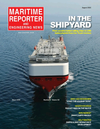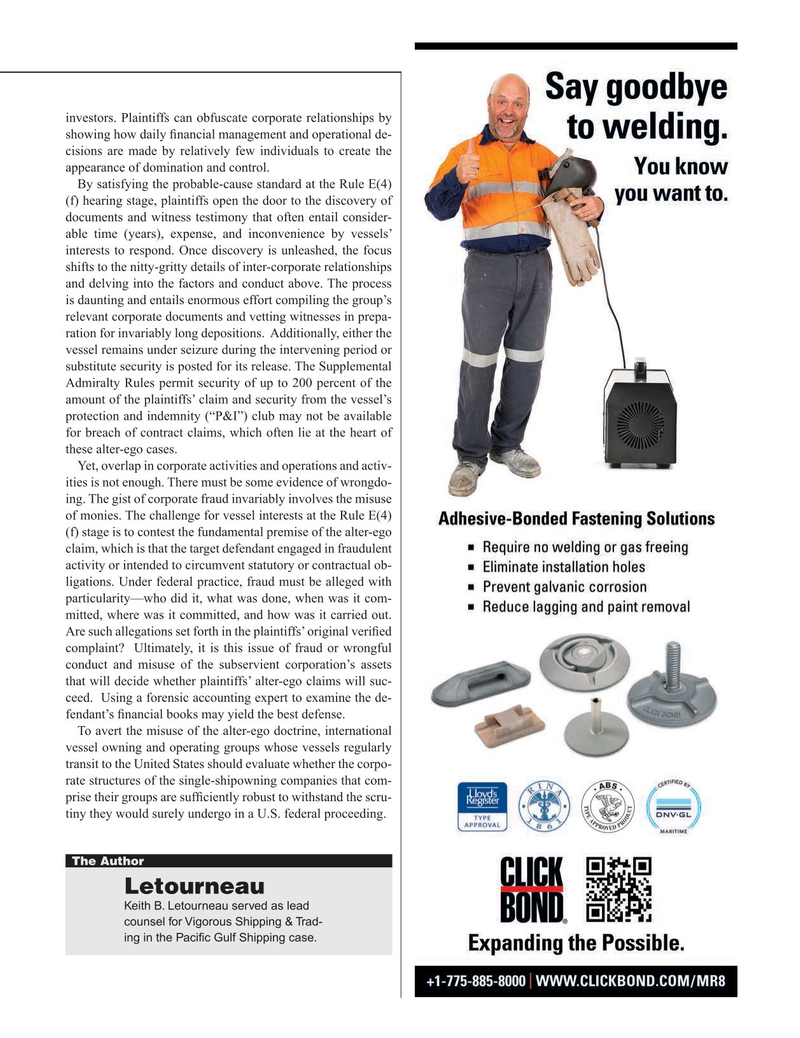
Page 19: of Maritime Reporter Magazine (August 2021)
The Shipyard Annual
Read this page in Pdf, Flash or Html5 edition of August 2021 Maritime Reporter Magazine
investors. Plaintiffs can obfuscate corporate relationships by showing how daily ? nancial management and operational de- cisions are made by relatively few individuals to create the appearance of domination and control.
By satisfying the probable-cause standard at the Rule E(4) (f) hearing stage, plaintiffs open the door to the discovery of documents and witness testimony that often entail consider- able time (years), expense, and inconvenience by vessels’ interests to respond. Once discovery is unleashed, the focus shifts to the nitty-gritty details of inter-corporate relationships and delving into the factors and conduct above. The process is daunting and entails enormous effort compiling the group’s relevant corporate documents and vetting witnesses in prepa- ration for invariably long depositions. Additionally, either the vessel remains under seizure during the intervening period or substitute security is posted for its release. The Supplemental
Admiralty Rules permit security of up to 200 percent of the amount of the plaintiffs’ claim and security from the vessel’s protection and indemnity (“P&I”) club may not be available for breach of contract claims, which often lie at the heart of these alter-ego cases.
Yet, overlap in corporate activities and operations and activ- ities is not enough. There must be some evidence of wrongdo- ing. The gist of corporate fraud invariably involves the misuse of monies. The challenge for vessel interests at the Rule E(4) (f) stage is to contest the fundamental premise of the alter-ego claim, which is that the target defendant engaged in fraudulent activity or intended to circumvent statutory or contractual ob- ligations. Under federal practice, fraud must be alleged with particularity—who did it, what was done, when was it com- mitted, where was it committed, and how was it carried out.
Are such allegations set forth in the plaintiffs’ original veri? ed complaint? Ultimately, it is this issue of fraud or wrongful conduct and misuse of the subservient corporation’s assets that will decide whether plaintiffs’ alter-ego claims will suc- ceed. Using a forensic accounting expert to examine the de- fendant’s ? nancial books may yield the best defense.
To avert the misuse of the alter-ego doctrine, international vessel owning and operating groups whose vessels regularly transit to the United States should evaluate whether the corpo- rate structures of the single-shipowning companies that com- prise their groups are suf? ciently robust to withstand the scru- tiny they would surely undergo in a U.S. federal proceeding.
The Author
Letourneau
Keith B. Letourneau served as lead counsel for Vigorous Shipping & Trad- ing in the Paci? c Gulf Shipping case.
MR #8 (18-33).indd 19 8/2/2021 6:07:20 PM

 18
18

 20
20
